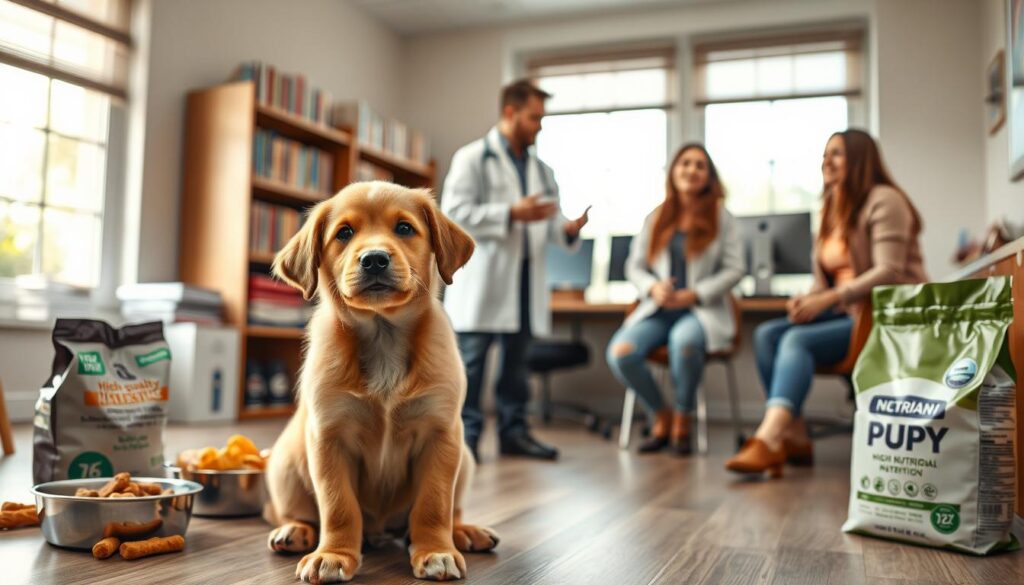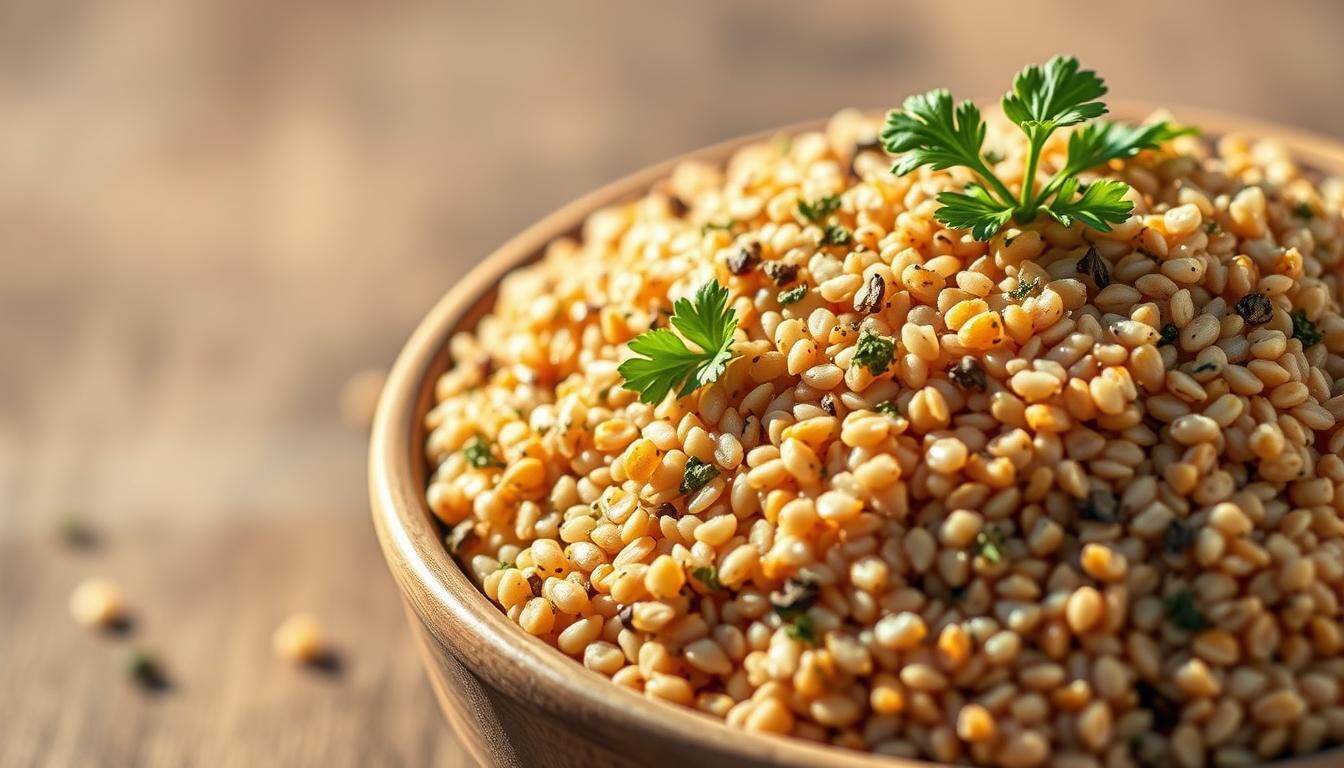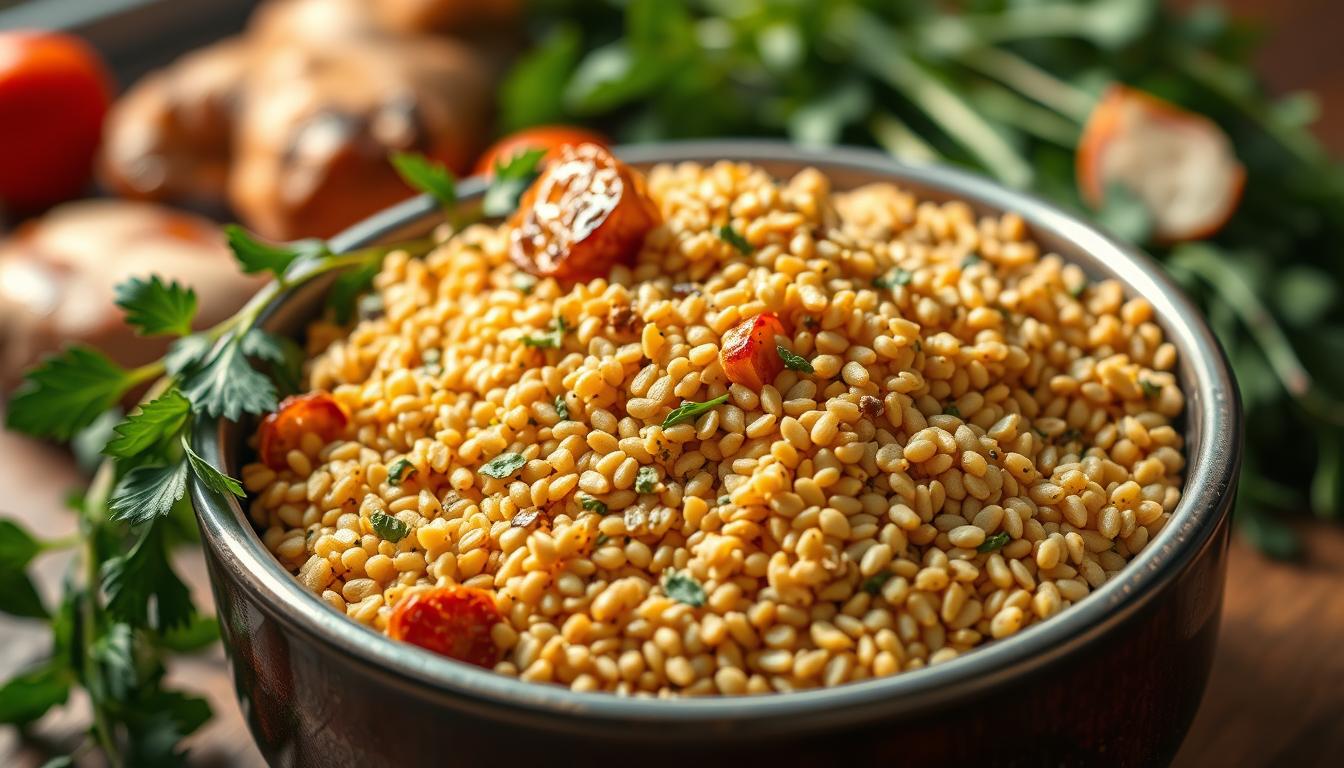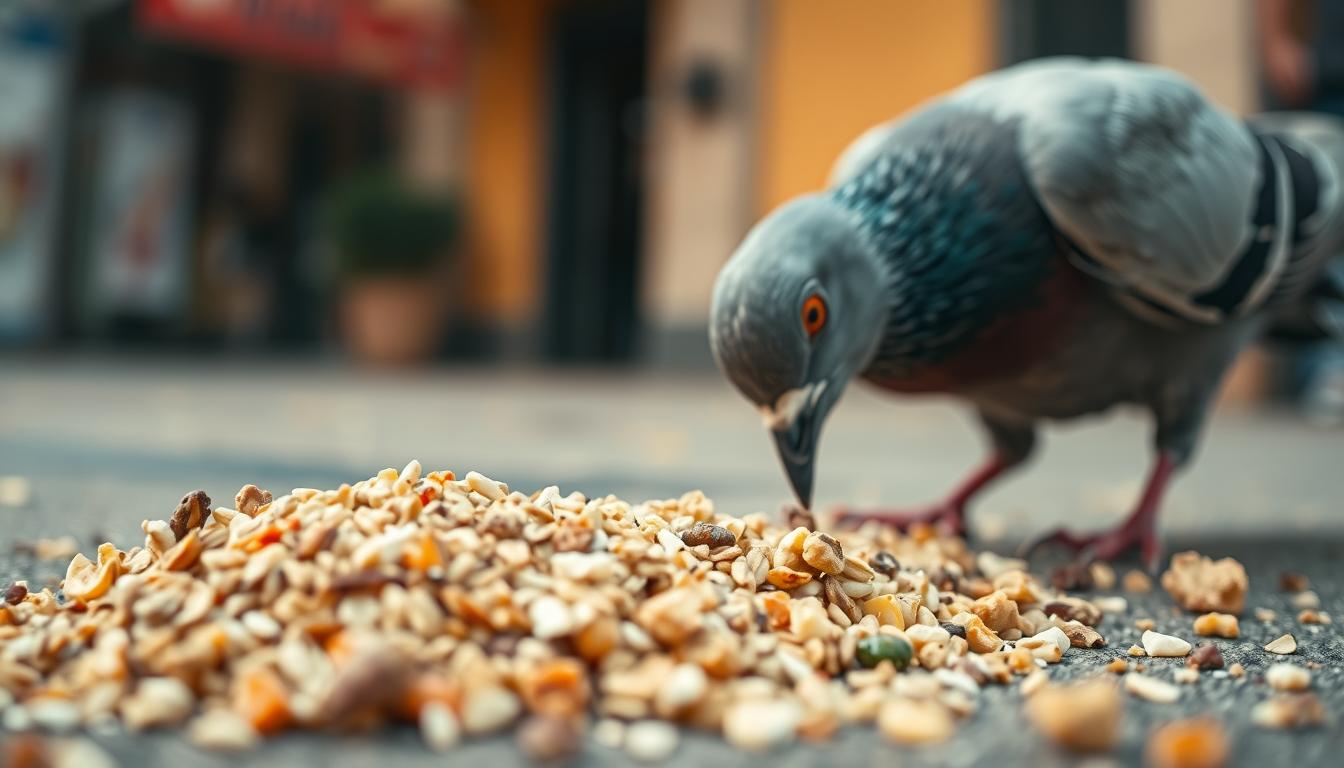Ever wondered, can puppies have ice cream? While it may seem adorable to share a sweet treat with your furry friend, it’s not that simple. Many pet owners love giving their pups a taste of their favorite snacks, but ice cream isn’t the best choice for puppies.
Dogs and ice cream don’t go well together for many reasons. Lactose intolerance is just the tip of the iceberg. Most puppies can’t digest dairy because they lack the right enzyme, leading to big digestive issues.
Your puppy’s health is super important. Ice cream has ingredients that can cause serious problems, from upset stomachs to long-term health issues. Vets say what looks like a harmless treat can actually be very dangerous for your dog.
Before you grab that ice cream cone, it’s key to know the dangers. The next parts will share important facts every pet owner should know about dogs and ice cream.
Table of Contents
The Allure of Ice Cream for Puppies
Pet owners often want to share special moments with their furry friends. The urge to give them treats we like is natural. But, not all treats are safe for dogs.
Dogs have a super strong sense of smell, much stronger than humans. This makes some foods very tempting to them.
Ice cream might seem like a tasty treat for puppies. Their curiosity and strong senses make them want to try it. But, not all treats are safe for puppies.
Why Owners Are Drawn to Sharing Treats
Dogs have fewer taste receptors than humans, which affects how they taste food. Yet, they are drawn to certain flavors and textures. Owners share treats for many reasons:
- Desire to bond with their pet
- Wanting to provide a moment of joy
- Believing human food equals love
- Thinking cold treats might help on hot days
The Emotional Appeal of Treating Your Dog
The bond between dogs and their owners makes us want to share food. Meaty flavors and warm, moist textures are more appealing to dogs. But, we must think about our puppy’s health first, not just the momentary joy.
Remember: Just because your dog wants something doesn’t mean it’s good for them!
Understanding Canine Digestion
Feeding puppies requires knowing their unique digestive system. Dogs digest food differently than humans, especially with dairy.
Your puppy’s diet is key to their health. Most dogs can’t break down lactose well because they lack the enzyme. This means dairy can upset their stomachs.
How Dogs Process Dairy Products
Puppies react differently to dairy. They can’t digest milk sugars well because of lactose intolerance. Here are important facts about dairy digestion:
- Puppies produce less lactase as they grow older
- Dairy can cause immediate digestive upset
- Symptoms vary based on individual dog sensitivity
- Lactose content differs between dairy products
Common Signs of Digestive Issues
It’s important to know when your puppy has digestive problems. Look out for these signs after they eat dairy:
- Bloating and excessive gas
- Loose or watery stools
- Vomiting
- Decreased appetite
- Abdominal discomfort
Veterinarians recommend monitoring your puppy closely after introducing any new food to their diet.
Knowing how your puppy’s stomach works helps you choose the right food. This can prevent health issues.
Ingredients in Ice Cream That Are Harmful
Ice cream is not safe for puppies. Many pet owners don’t know the dangers it poses. Knowing the harmful ingredients can keep your dog healthy.
Can puppies have ice cream? The answer is no. Ice cream has ingredients that are bad for dogs:
- High sugar content that can lead to obesity
- Potential for triggering pancreatitis
- Risk of diabetes development
- Digestive system complications
Sugar’s Dangerous Impact on Canine Health
Sugar is bad for puppies. It can cause obesity and other health problems. Dogs can’t handle sugar like humans do.
Artificial Sweeteners: A Toxic Threat
Artificial sweeteners, especially xylitol, are very dangerous for dogs. Even a little can harm them a lot. Xylitol can cause:
- Rapid insulin release
- Potential liver failure
- Seizures
- Dramatic drops in blood sugar
Just 0.1 grams of xylitol per kilogram of body weight can create life-threatening complications for your puppy.
When looking for treats for your dog, choose safe options. Always talk to a vet about what’s best for your dog.
Lactose Intolerance in Dogs
Dogs and ice cream can be a tricky mix. Many dogs have trouble with dairy, making ice cream a risky treat for puppies.
Lactose intolerance is common in dogs. Adult dogs often don’t have enough lactase enzyme. This enzyme is key for breaking down dairy.
Prevalence Among Puppies
Puppies might have an easier time with dairy. They often make more lactase, which helps them digest small amounts of dairy. But, this doesn’t mean ice cream is safe for them.
Key Symptoms to Recognize
- Bloating and abdominal discomfort
- Loose or watery stools
- Excessive gas
- Vomiting within two hours after consuming dairy
Dogs with lactose intolerance can face big digestive problems after eating ice cream. The sugar and dairy in ice cream are especially hard for them.
Always consult your veterinarian before introducing new foods to your puppy’s diet.
Be careful with dairy treats for puppies. While a little might be okay, too much can cause long-term digestive issues.
Alternatives to Ice Cream for Puppies
Keeping your furry friend cool and happy doesn’t mean using traditional ice cream. Puppy treats can be safe and tasty if you choose the right ones. These treats should make your pup happy and meet their nutritional needs.
Dogs enjoy cool snacks, and you can make healthy ones at home. These treats are not only tasty but also full of nutrients. They’re a great way to keep your puppy cool during hot days.
Dog-Friendly Frozen Treat Options
Here are some safe and tasty treats for your puppy:
- Frozen fruit chunks (seedless watermelon, blueberries)
- Plain yogurt popsicles
- Frozen low-sodium chicken or beef broth
- Mashed banana frozen treats
DIY Frozen Treat Recipes
Making homemade treats is simple. Here’s a quick recipe:
- Mix 16 oz plain yogurt
- Add 1 ripe banana
- Blend in ⅓ cup natural peanut butter
- Pour into silicone molds
- Freeze for 2-3 hours
When making treats, keep these tips in mind:
- Use only dog-safe ingredients
- Avoid added sugars
- Check for potential allergens
- Limit treats to 10% of daily diet
Tip: Always check with your vet before trying new treats to make sure they’re right for your puppy.
By choosing healthy, homemade treats, you can give your puppy yummy frozen snacks. These treats will support their health and happiness.
The Risks of Overindulgence
Managing your puppy’s diet is very important. It’s about controlling how much they eat and how many treats they get. Obesity in dogs is a big problem in the United States, affecting about 56% of them. It’s key to know the dangers of overfeeding for your puppy’s health.

Feeding puppies right is crucial. Too many treats can cause big health problems. These include:
- Diabetes
- Joint problems
- Reduced mobility
- Decreased life expectancy
Understanding Canine Weight Management
Puppies metabolize food differently than humans. They might want more treats, but their bodies handle food in unique ways. Even one extra treat can be a big deal for their daily calories.
Portion Control Tips for Treats
To keep your puppy healthy, try these tips:
- Limit treats to 10% of daily caloric intake
- Use small, bite-sized rewards
- Choose nutrient-dense, low-calorie options
- Track treat consumption
- Consult your veterinarian for personalized guidance
Remember, loving your puppy means protecting their health through mindful feeding practices.
Special Health Conditions to Consider
When thinking about whether puppies can have ice cream, it’s key to know about health challenges. Your puppy’s diet needs careful thought, especially if they have health issues.
Some health problems make ice cream risky for your dog. Knowing these risks helps you make better choices for your puppy’s diet.
Diabetic Dogs and Sweet Treats
About 1 in 300 dogs have diabetes, making treats like ice cream dangerous. For diabetic puppies, ice cream can:
- Cause rapid blood sugar spikes
- Disrupt insulin management
- Lead to serious health problems
“Not all treats are created equal, especially for dogs with special health needs.” – Veterinary Nutrition Expert
Allergy Considerations for Canines
Food allergies can make ice cream risky for some puppies. About 10% of dogs can’t digest lactose, so they should avoid dairy.
Look out for these allergy signs:
- Digestive discomfort
- Skin irritations
- Gastrointestinal issues
- Respiratory problems
Always talk to your vet before adding new foods to your puppy’s diet, especially with health issues.
Veterinary Opinions on Treating Puppies

Vets are key in helping pet owners choose safe treats for puppies. They stress the need to know about nutritional needs and health risks from human foods.
“Not all treats are created equal. Pet owners must be vigilant about what they feed their young dogs.” – Dr. Emily Richardson, DVM
Professional Recommendations for Safe Treating
Vets give clear advice on safe puppy treats. Here’s how to treat your puppy right:
- Choose treats made just for puppies
- Keep treats under 10% of daily calories
- Stay away from human foods that could harm
- Always check with your vet before new treats
Guidelines for Responsible Indulgence
Vets say to follow these tips for puppy treats:
- Pick treats that are good for their diet
- Be on the lookout for allergies
- Start new treats slowly
- Keep an eye on how much you give
It’s important to know what your puppy needs to eat. While treats are fun, they shouldn’t replace a full, balanced diet. Vets know best.
Remember: Your puppy’s health is always the top priority!
Educating Children About Pet Treats
Teaching kids about safe puppy treats is key for a good bond between them and their pets. Young pet owners must know the value of picking the right treats. These treats should help their dog stay healthy and happy.
Introduce kids to pet treat rules in a fun and learning way. It’s important to pick safe treats and watch how they give them to puppies.
Safe Treating Habits for Kids
- Always ask an adult before giving treats to a puppy
- Learn which foods are dangerous for dogs
- Use portion control with puppy treats
- Understand that not all human foods are safe for dogs
Fun Ways to Include Pets in Treat Time
Getting kids involved in giving treats can be both fun and educational. Training sessions can turn treat time into a special bonding moment. Here are some fun activities:
- Create homemade dog-friendly frozen treats together
- Practice basic obedience commands with small puppy treats
- Learn about nutrition through pet treat preparation
Remember, puppy treats should be nutritious, small, and given in moderation!
Teaching kids about safe treats helps them grow in empathy, responsibility, and animal care.
Real Stories from Dog Owners
Dog owners across the United States have learned valuable lessons about dogs and ice cream through personal experiences. These stories highlight the importance of making informed choices about healthy puppy treats.
Real pet parents have shared compelling narratives that underscore the risks and alternatives to traditional ice cream treats. Their experiences reveal critical insights into canine nutrition and treat management.
Positive Experiences with Alternatives
Many dog owners have discovered creative and safe treat options that keep their puppies happy and healthy:
- Frozen banana slices as a cool summer treat
- Homemade yogurt-based frozen treats
- Specially designed dog-friendly frozen snacks
Sarah from Seattle shared how her Labrador puppy now loves frozen watermelon chunks instead of traditional ice cream.
Cautionary Tales of Ice Cream Mishaps
Not all experiences with dogs and ice cream end positively. Some pet owners learned tough lessons about dairy consumption:
- One dog experienced severe digestive issues after consuming dairy
- Another puppy developed temporary lactose intolerance symptoms
- Some dogs faced potential weight gain from sugary treats
These stories emphasize the critical need for pet owners to carefully select treats. Understanding your dog’s unique dietary needs can prevent potential health complications.
Conclusion: Making Safe Choices for Your Puppy
It’s important to know if puppies can have ice cream. Standard ice cream is not safe for dogs. It can cause health problems because most dogs can’t digest lactose and it has too much sugar.
Choosing the right treats for your puppy is key. Instead of ice cream, look for dog-friendly options. These can include special dog treats, homemade frozen snacks, or vet-approved goodies.
Good food choices are vital for your puppy’s health. Feed them high-quality dog food and give them safe treats sometimes. But remember, treats should only be 10% of their daily calories. This helps avoid problems like diabetes and joint issues.
By avoiding ice cream and choosing safer options, you can give your puppy tasty, healthy treats. Always talk to your vet about the best treats for your puppy. This ensures they stay healthy and happy.
FAQ
Can puppies eat any type of ice cream?
No, puppies should not eat ice cream. Most ice creams have ingredients that can harm dogs. These include dairy, high sugar, and artificial sweeteners like xylitol. Puppies can’t digest dairy well because they are lactose intolerant.
Why are puppies sensitive to dairy products?
Puppies don’t have enough lactase to break down lactose in dairy. This intolerance causes digestive issues like diarrhea and vomiting. It also leads to stomach pain and discomfort.
What symptoms should I watch for if my puppy accidentally eats ice cream?
Look out for signs of digestive trouble. These include diarrhea, vomiting, and stomach pain. Also, watch for bloating, excessive gas, and a lack of appetite. If these symptoms last, call your vet right away.
Are there any safe frozen treats for puppies?
Yes! You can make safe frozen treats for puppies. Use frozen pureed pumpkin, low-sodium chicken broth, and plain yogurt. Also, frozen fruit like banana or watermelon is okay in small amounts. Always check with your vet before giving new treats to your puppy.
How dangerous are artificial sweeteners in ice cream for dogs?
Artificial sweeteners, especially xylitol, are very harmful to dogs. Even a little can cause a drop in blood sugar, leading to liver failure and death. Always read labels and keep xylitol away from puppies.
Can older dogs eat ice cream more safely than puppies?
Adult dogs might handle small amounts better, but ice cream is still not good. Older dogs can still have lactose intolerance. The sugar in ice cream can also lead to obesity, diabetes, and other health problems.
What are the long-term risks of feeding puppies ice cream?
Long-term risks include obesity and dental problems. Ice cream can also lead to diabetes and damage the digestive system. It can cause nutritional imbalances and increase the risk of pancreatitis.
How can I safely treat my puppy on hot days?
Instead of ice cream, try frozen dog-safe fruits and ice cubes. You can also use frozen low-sodium broth or dog-friendly frozen treats. Make sure they have plenty of fresh, cool water to drink.
Are there any commercial ice cream alternatives for dogs?
Yes! Many brands now make frozen treats for dogs. These are lactose-free, low in sugar, and made with safe ingredients. They are nutritionally balanced and designed for dogs.
Source Links
- Can Dogs Eat Ice Cream? Human Food for Dogs – https://www.kinship.com/dog-nutrition/can-dogs-eat-ice-cream
- Foods Your Dog Should Never Eat – https://www.webmd.com/pets/dogs/ss/slideshow-foods-your-dog-should-never-eat
- Dog Ice Cream – https://creativescookery.com/dog-ice-cream/
- Can Dogs Taste Sugar? – https://www.kinship.com/dog-nutrition/can-dogs-taste-sugar
- Where To Buy Dog Ice Cream? – https://www.woofie.org/travel-lifestyle/where-to-buy-dog-ice-cream/
- Can Dogs Eat Ice Cream? Here’s What the Experts Say – https://www.rd.com/article/can-dogs-eat-ice-cream/
- No title found – https://www.akc.org/expert-advice/nutrition/human-foods-dogs-can-and-cant-eat/
- Can Dogs Drink Milk? | Dog Food Advisor – https://www.dogfoodadvisor.com/canine-nutrition/dogs-milk-dairy-products/
- Can Dogs Eat Ice Cream? What Every Pet Owner Should Know – https://www.pumpkin.care/blog/can-dogs-eat-ice-cream/
- Can dogs eat ice cream? – https://www.naturesmenu.co.uk/blog-can-dogs-eat-ice-cream.html
- Can Dogs Eat Ice Cream? The Pros and Cons | Spot® – https://spotpet.com/blog/dog-tips/can-dogs-eat-ice-cream
- Can Dogs Eat Ice Cream? – https://www.thesprucepets.com/can-dogs-eat-ice-cream-4684033
- Is Ice Cream for Dogs Safe? What You Need to Know About This Popular Treat – Petful – https://www.petful.com/pet-health/ice-cream-for-dogs/
- No title found – https://www.akc.org/expert-advice/nutrition/diy-frozen-dog-treats/
- Dog Ice Cream. A Frosty Paws copycat – https://foodwithfeeling.com/dog-ice-cream-a-frosty-paws-copycat/
- 6 Dog-Friendly Ice Cream Options for Your Pup to Enjoy This Summer – https://www.kinship.com/dog-nutrition/dog-friendly-ice-cream
- 7 Holiday Foods to Avoid Feeding Your Pet | Bond Vet – https://bondvet.com/b/7-holiday-foods-to-avoid-feeding-your-pet
- Can Dogs Eat Sugar? Truth vs. Myth | Pet Parenting – https://www.trupanion.com/pet-blog/article/can-dogs-eat-sugar
- So You Overindulged Over the Long Weekend? Here’s Why That’s OK – https://theeverygirl.com/after-overindulging-self-care/
- Can Dogs Eat Ice Cream? Vet-Verified Health & Safety Guide – Dogster – https://www.dogster.com/dog-nutrition/can-dogs-eat-ice-cream
- Can Dogs Eat Ice Cream? Nutrition & Safety Tips | Hepper – https://www.hepper.com/can-dogs-eat-ice-cream/
- Can Dogs Eat Chocolate Ice Cream? Vet-Verified Nutrition Facts & Risks – Dogster – https://www.dogster.com/dog-health-care/can-dogs-eat-chocolate-ice-cream
- Can Dogs Eat Chocolate Ice Cream? Vet Approved Facts & FAQ | Hepper – https://www.hepper.com/can-dogs-eat-chocolate-ice-cream/
- Homemade Dog Ice Cream – Gemma’s Bigger Bolder Baking – https://www.biggerbolderbaking.com/ice-cream-dogs/
- Dogs’ Hilarious Review of Ben & Jerry’s Ice Cream Will Leave You In Tears – Rocky Kanaka – https://rockykanaka.com/dogs-hilarious-review-of-ben-jerrys-ice-cream-will-leave-you-in-tears/
- Can Dogs Eat This? Foods You Can Safely Share (And Some Which You Must Never Feed To A Dog) – https://www.thelabradorsite.com/can-dogs-eat-this/
- Dog runs for ice cream every time he hears van, patiently “waits in line” – https://www.newsweek.com/dog-runs-ice-cream-every-time-hears-van-patiently-waits-line-1927619
- Can Dogs Eat Whipped Cream? – https://www.dailypaws.com/dogs-puppies/dog-nutrition/what-can-dogs-eat/can-dogs-eat-whipped-cream
- Does Your Dog Really Belong in This Restaurant? – https://www.nytimes.com/2024/05/16/dining/dogs-nyc-restaurants.html
- Can Dogs Eat Ice Cream Cones? Vet-Reviewed Risks & Healthy Diet Tips | PangoVet – https://pangovet.com/pet-health-wellness/dogs/can-dogs-eat-ice-cream-cones/
- How to Make Dog Ice Cream at Home: Easy Recipes – https://www.savoritrecipes.com/how-to-make-dog-ice-cream-at-home/
- Can Dogs Eat Coconut Ice Cream? Vet-Reviewed Risks & FAQs | PangoVet – https://pangovet.com/pet-nutrition/dogs/can-dogs-eat-coconut-ice-cream/




